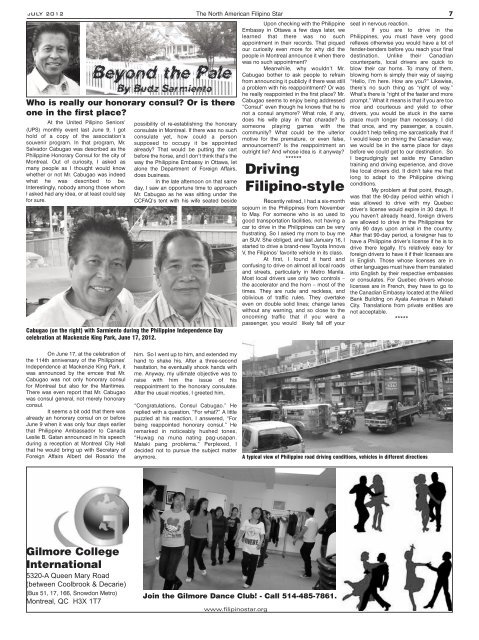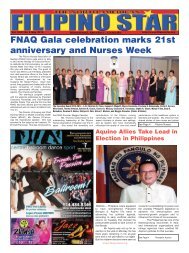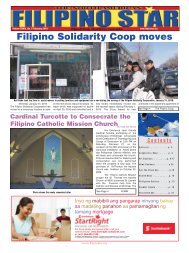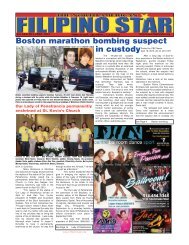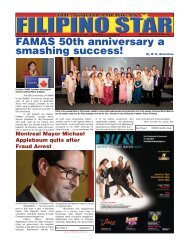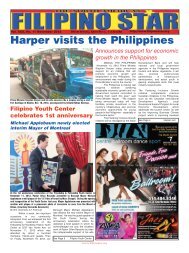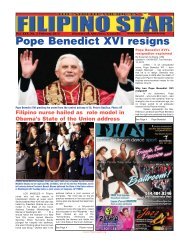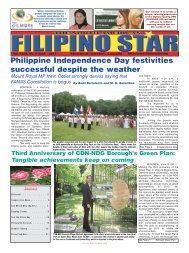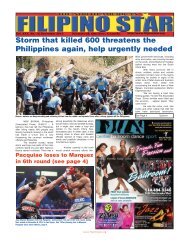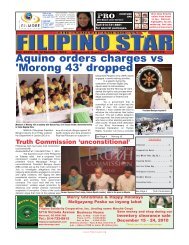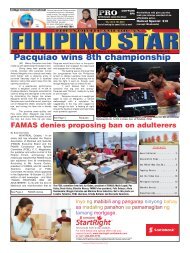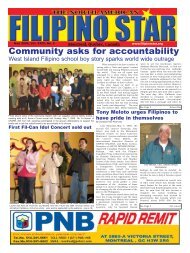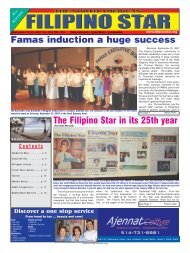Filipino Star July 2012 Issue
Filipino Star July 2012 Issue
Filipino Star July 2012 Issue
Create successful ePaper yourself
Turn your PDF publications into a flip-book with our unique Google optimized e-Paper software.
jULY <strong>2012</strong> The North American <strong>Filipino</strong> <strong>Star</strong><br />
7<br />
Who is really our honorary consul? Or is there<br />
one in the first place?<br />
At the United Pilipino Seniors’<br />
(UPS) monthly event last June 9, I got<br />
hold of a copy of the association’s<br />
souvenir program. In that program, Mr.<br />
Salvador Cabugao was described as the<br />
Philippine Honorary Consul for the city of<br />
Montreal. Out of curiosity, I asked as<br />
many people as I thought would know<br />
whether or not Mr. Cabugao was indeed<br />
what he was described to be.<br />
Interestingly, nobody among those whom<br />
I asked had any idea, or at least could say<br />
for sure.<br />
On June 17, at the celebration of<br />
the 114th anniversary of the Philippines’<br />
Independence at Mackenzie King Park, it<br />
was announced by the emcee that Mr.<br />
Cabugao was not only honorary consul<br />
for Montreal but also for the Maritimes.<br />
There was even report that Mr. Cabugao<br />
was consul general, not merely honorary<br />
consul.<br />
It seems a bit odd that there was<br />
already an honorary consul on or before<br />
June 9 when it was only four days earlier<br />
that Philippine Ambassador to Canada<br />
Leslie B. Gatan announced in his speech<br />
during a reception at Montreal City Hall<br />
that he would bring up with Secretary of<br />
Foreign Affairs Albert del Rosario the<br />
possibility of re-establishing the honorary<br />
consulate in Montreal. If there was no such<br />
consulate yet, how could a person<br />
supposed to occupy it be appointed<br />
already? That would be putting the cart<br />
before the horse, and I don’t think that’s the<br />
way the Philippine Embassy in Ottawa, let<br />
alone the Department of Foreign Affairs,<br />
does business.<br />
In the late afternoon on that same<br />
day, I saw an opportune time to approach<br />
Mr. Cabugao as he was sitting under the<br />
CCFAQ’s tent with his wife seated beside<br />
Cabugao (on the right) with Sarmiento during the Philippine Independence Day<br />
celebration at Mackenzie King Park, June 17, <strong>2012</strong>.<br />
Gilmore College<br />
International<br />
5320-A Queen Mary Road<br />
(between Coolbrook & Decarie)<br />
(Bus 51, 17, 166, Snowdon Metro)<br />
Montreal, QC H3X 1T7<br />
him. So I went up to him, and extended my<br />
hand to shake his. After a three-second<br />
hesitation, he eventually shook hands with<br />
me. Anyway, my ultimate objective was to<br />
raise with him the issue of his<br />
reappointment to the honorary consulate.<br />
After the usual niceties, I greeted him,<br />
“Congratulations, Consul Cabugao.” He<br />
replied with a question, “For what?” A little<br />
puzzled at his reaction, I answered, “For<br />
being reappointed honorary consul.” He<br />
remarked in noticeably hushed tones,<br />
“Huwag na muna nating pag-usapan.<br />
Malaki pang problema.” Perplexed, I<br />
decided not to pursue the subject matter<br />
anymore.<br />
www.filipinostar.org<br />
Upon checking with the Philippine<br />
Embassy in Ottawa a few days later, we<br />
learned that there was no such<br />
appointment in their records. That piqued<br />
our curiosity even more for why did the<br />
people in Montreal announce it when there<br />
was no such appointment?<br />
Meanwhile, why wouldn’t Mr.<br />
Cabugao bother to ask people to refrain<br />
from announcing it publicly if there was still<br />
a problem with his reappointment? Or was<br />
he really reappointed in the first place? Mr.<br />
Cabugao seems to enjoy being addressed<br />
“Consul” even though he knows that he is<br />
not a consul anymore? What role, if any,<br />
does his wife play in that charade? Is<br />
someone playing games with the<br />
community? What could be the ulterior<br />
motive for the premature, or even false,<br />
announcement? Is the reappointment an<br />
outright lie? And whose idea is it anyway?<br />
******<br />
Driving<br />
<strong>Filipino</strong>-style<br />
Recently retired, I had a six-month<br />
sojourn in the Philippines from November<br />
to May. For someone who is so used to<br />
good transportation facilities, not having a<br />
car to drive in the Philippines can be very<br />
frustrating. So I asked my mom to buy me<br />
an SUV. She obliged, and last January 16, I<br />
started to drive a brand-new Toyota Innova<br />
V, the <strong>Filipino</strong>s’ favorite vehicle in its class.<br />
At first, I found it hard and<br />
confusing to drive on almost all local roads<br />
and streets, particularly in Metro Manila.<br />
Most local drivers use only two controls –<br />
the accelerator and the horn – most of the<br />
times. They are rude and reckless, and<br />
oblivious of traffic rules. They overtake<br />
even on double solid lines; change lanes<br />
without any warning, and so close to the<br />
oncoming traffic that if you were a<br />
passenger, you would likely fall off your<br />
seat in nervous reaction.<br />
If you are to drive in the<br />
Philippines, you must have very good<br />
reflexes otherwise you would have a lot of<br />
fender-benders before you reach your final<br />
destination. Unlike their Canadian<br />
counterparts, local drivers are quick to<br />
blow their car horns. To many of them,<br />
blowing horn is simply their way of saying<br />
“Hello, I’m here. How are you?” Likewise,<br />
there’s no such thing as “right of way.”<br />
What’s there is “right of the faster and more<br />
prompt.” What it means is that if you are too<br />
nice and courteous and yield to other<br />
drivers, you would be stuck in the same<br />
place much longer than necessary. I did<br />
that once, and my passenger, a cousin,<br />
couldn’t help telling me sarcastically that if<br />
I would keep on driving the Canadian way,<br />
we would be in the same place for days<br />
before we could get to our destination. So<br />
I begrudgingly set aside my Canadian<br />
training and driving experience, and drove<br />
like local drivers did. It didn’t take me that<br />
long to adapt to the Philippine driving<br />
conditions.<br />
My problem at that point, though,<br />
was that the 90-day period within which I<br />
was allowed to drive with my Quebec<br />
driver’s license would expire in 30 days. If<br />
you haven’t already heard, foreign drivers<br />
are allowed to drive in the Philippines for<br />
only 90 days upon arrival in the country.<br />
After that 90-day period, a foreigner has to<br />
have a Philippine driver’s license if he is to<br />
drive there legally. It’s relatively easy for<br />
foreign drivers to have it if their licenses are<br />
in English. Those whose licenses are in<br />
other languages must have them translated<br />
into English by their respective embassies<br />
or consulates. For Quebec drivers whose<br />
licenses are in French, they have to go to<br />
the Canadian Embassy located at the Allied<br />
Bank Building on Ayala Avenue in Makati<br />
City. Translations from private entities are<br />
not acceptable.<br />
*****<br />
A typical view of Philippine road driving conditions, vehicles in different directions<br />
Join the Gilmore Dance Club! - Call 514-485-7861.


